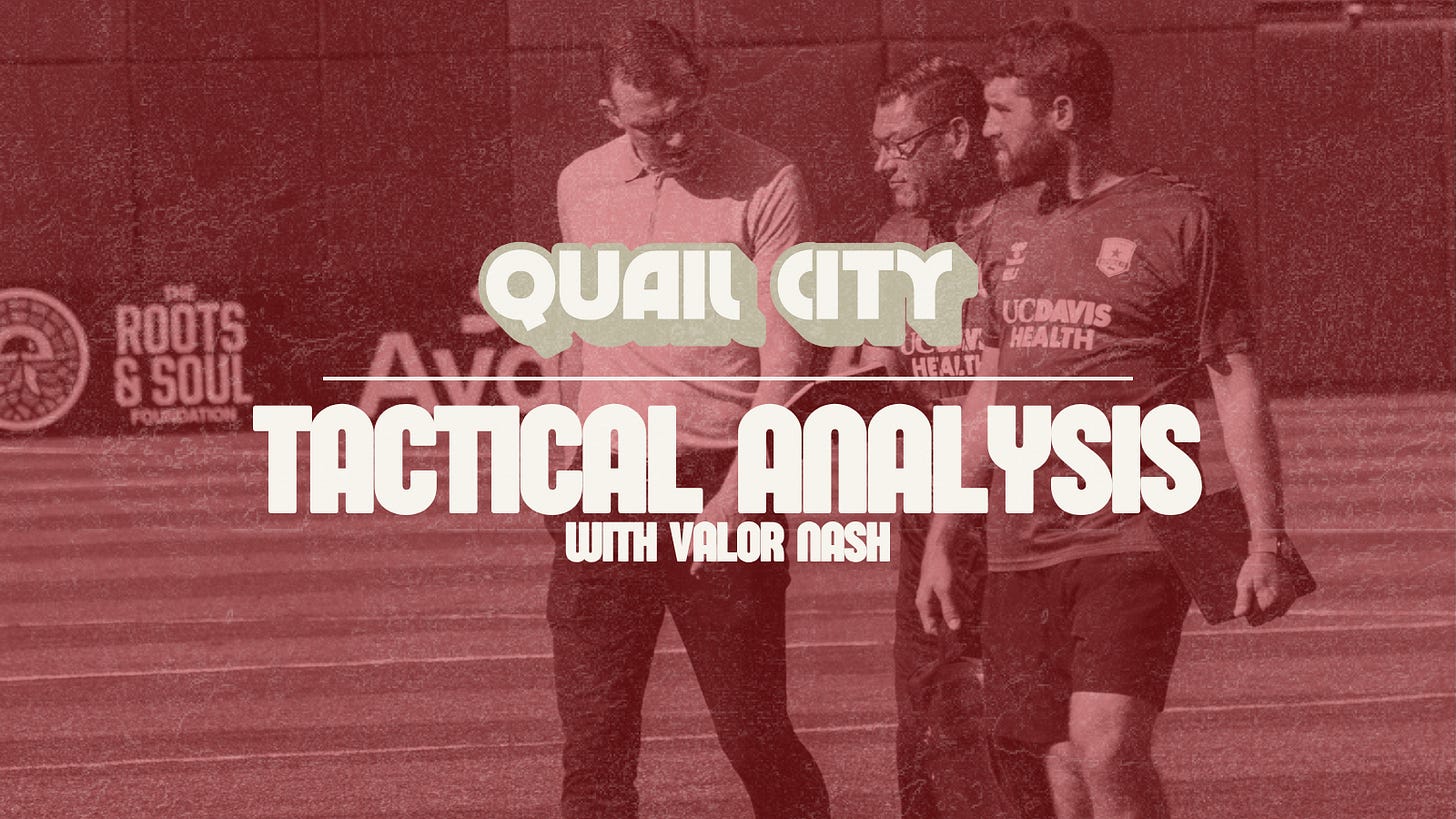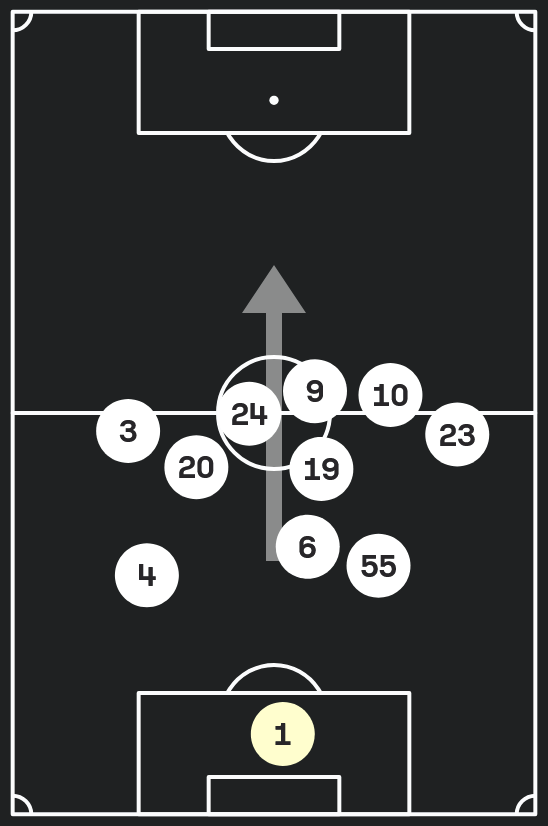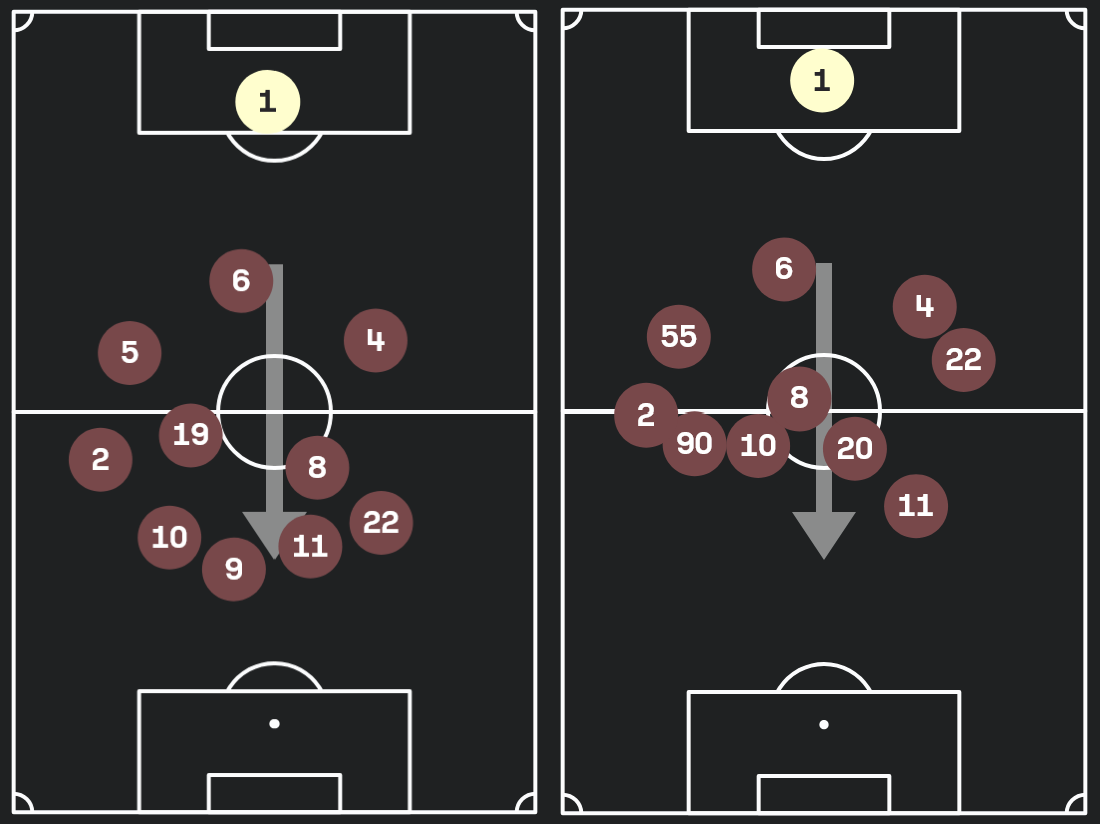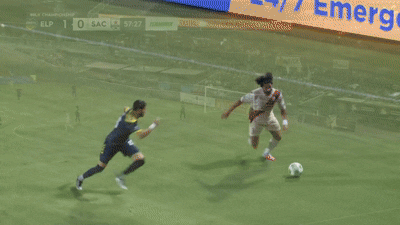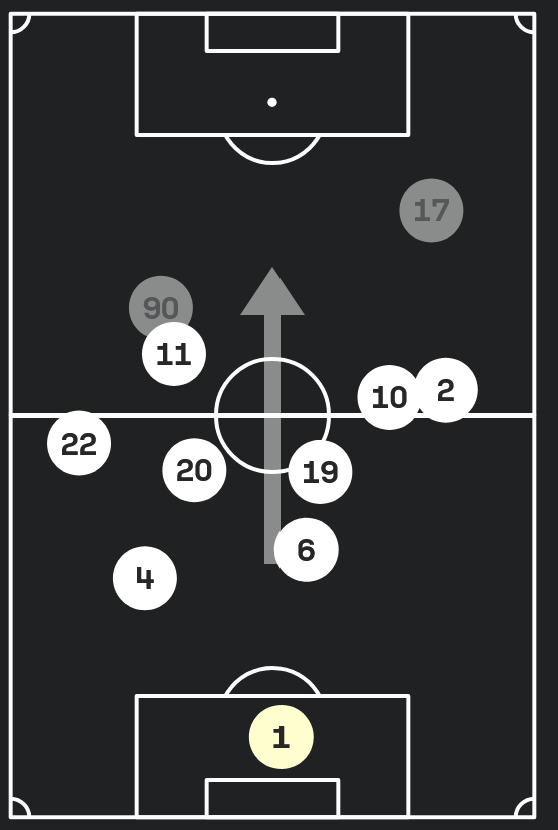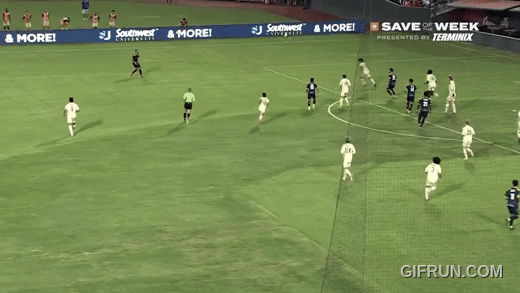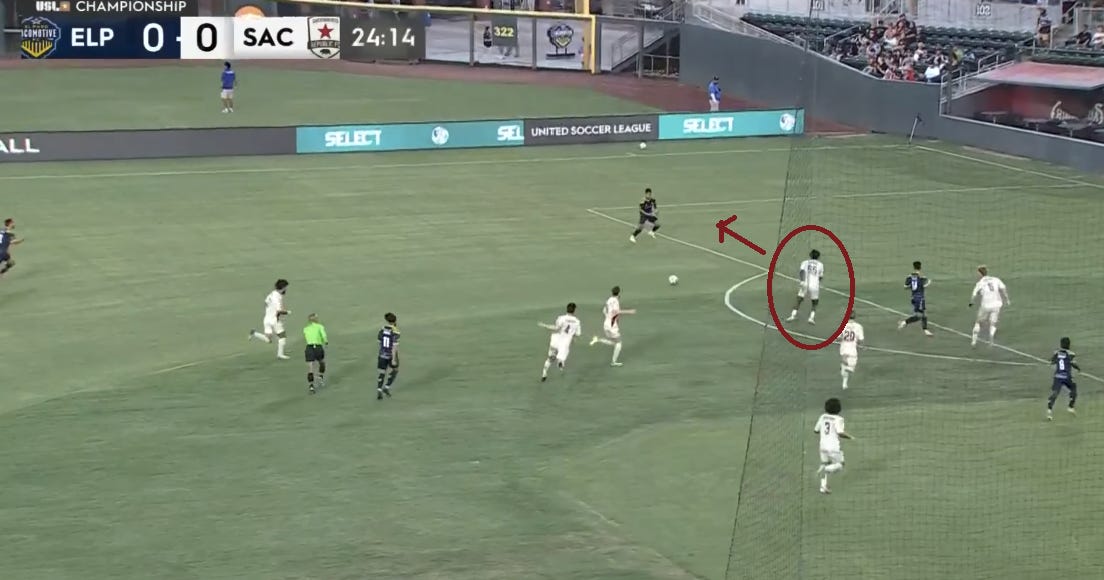Sacramento at El Paso: Tactical Analysis - Tired Legs, Struggling Tactics
08/23: Sacramento’s line up, the good, the bad, and what stood out
The Lineup:
It was a night where Republic struggled to get much of anything going against an El Paso side that is now equal to Sacramento in the standings. Republic came into the night fresh off over 4,000 miles of flying during the week—from Sacramento to D.C. and then on to El Paso. Account for the hard fought derby against Oakland, and the match against Loudoun, both of which required the use of all of Republic’s starters, and you get an exhausting week that required Collins to dig deep into his depth chart.
And dig in he did. It’s 20 games in to the regular season, and Jamieson, Chibi, and Spaulding each made just their sixth league start. Also present in the starting XI was Edwards, who made just his second start for the club in the league play. In fact, over the three games last week, only Willey, Kleemann, and Desmond started all three. The trio also played every minute of each match, a significant testament to their fitness.
This left Republic with a starting XI that was not just tired but incohesive. All things considered, only losing this game 1-0 (and having a few chances to equalize) is something of a feat in and of itself. Collins was clearly aware of the tired legs and had the team set up in a very deep low block, similar to what we saw midweek at Loudoun. Here is a look at the average positioning for the starting XI:
Now compare that to the average position of the starting XI in the last 2 league games against Monterey Bay (left) and Oakland (right):
The difference here is fairly clear: against Monterey and Oakland, Republic had seven and five players (respectively) averaging positions in the opposition’s half. Against El Paso, that number dropped to just *two*—and neither of those players were positioned very far forward. Also, take a look at the backline: usually, Kleemann (6) is playing as the furthest back player, anchoring the defensive line, with the RCB and LCB each playing slightly further forward. Not so against El Paso, where both outside centerbacks had to step further back and in to defend deeper on the outside of the pitch. We’ll take a look below at how the subs changed the game, but Sacramento clearly came into this game looking to get a single point on the road.
The Good:
Good Subs and Jack Gurr Changing Games
I have to shout out Collins for his game management in this game. Dealing with tired legs and being forced to heavily rotate the squad, he nearly perfectly managed the substitutes mid-game. Sacramento had four starters with a player rating of 6.5 or lower—and Collins subbed all of them off. A 6.5 rating is bang on average; any lower, and the player is more detrimental to the team than the average player. With the exception of subbing Benítez (6.5 rating) on for Spaulding (6.7 rating), every single sub outperformed the starter they replaced. The one thing I think you can critique here is that Herrera probably needed to come off for Bennett much earlier than the 74th minute, especially given that he was the second-worst player on the pitch. But, I can see the logic in keeping him on to see what he could do with Gurr and Cicerone coming onto the pitch.
Speaking of Jack Gurr, the team shift from him on the bench in the first half to him on the pitch in the second half is incredible. Gurr literally changes games. Not only was he Republic’s third-best player on the night, trailing only Vitiello and Desmond, but he had the most “accurate crosses” of anyone in the match while he also had fifth most touches of any Republic player, created a chance on goal, and had a shot—all despite only playing one half. This shot by him was the closest Sacramento got to goal:
And look at how Republic’s average positioning above differs to how they look after the subs come on:
They go from two players in El Paso’s half to five, and this is a bit more like what we’ve seen throughout the season. It helps, of course, that Republic was chasing the game at this point, but they also did this while not allowing another goal. Collins made all the right moves to try and salvage this game, and it’s a real shame they didn’t pay off.
Won the Duel Battle
Republic won the duel battle in the air and on the ground—which is exactly what Republic relies on when they play their normal high press. As we discussed earlier, Republic didn’t utilize that press today, but they still won 56% of all 50/50 balls. That’s a positive to take away from a game with few of them; if they can continue to win more than 50% of duels, they’ll be in a great position when Collins has the team reimplement the high press.
Vitiello Made it a Close Game
The 1-0 score line doesn’t reflect just how much El Paso peppered the goal. El Paso had more shots on target (7) than Republic had total shots (5), and Vitiello is the only reason Republic had a fighting chance to get back into the match. Vitiello had six total saves, three of which were from shots inside the box, and had one punch. Through league play this season, Vitiello hasn’t allowed a single goal that came from a shot outside of the box, in impressive feat that forces opposing sides to move in on goal before shooting. And inside the box, he’s just as good. This save in the 40th minute to keep things equal is a “Save of the Week” candidate:
What makes this save elite is not the reaction time to get to the ball as it goes the opposite way across goal—instead, it’s where he’s able to push the ball away to. There is an El Paso attacker on the back post just waiting to poach this goal if Vitiello merely pushes this to the side.
The Bad:
Low Block = No Offense
Republic, for all intents and purposes, had no meaningful offense. Sure, there were two to three small chances in there, but Republic only managed one shot on target—and it was a lofted ball that was easily caught by the El Paso keeper. That one shot on target, which was Sacramento’s only shot of the entire first half, came in the 22nd minute and Republic wouldn’t get another shot at all until the 58th minute. It wasn’t until the subs came on a half time and then again in the 65th minute that Republic was finally able to move forward— even then, despite 55% possession in the second half, Republic only managed four shots total in the second half to El Paso’s nine.
The Forwards Have Gone Cold
So why did Republic struggle to get any shots off? Well, the strikers at the very front of the attack have gone complete cold. Since scoring a goal and getting an assist against El Paso a month ago, Herrera has started six of seven games. In that time, he’s averaged a player rating of 6.7 and has produced 0 goal contributions. Bennett has only been a marginal improvement—he’s also averaging a 6.7, but at least has goal to his name despite only starting one of those seven matches. Yet, in this one month time span, Republic scored 11 goals. Both Bennett and Herrera have had off-ball influences in some of those goals, a contribution that is hard to put to a stat, but regardless you would expect at least one of your forwards at the tip of the spear to be able to find the net.
So why was was that a problem tonight, when it hasn’t been an issue over the last month? Well, for the last month, Republic has been playing that high press. Who scores the goals in a high press is more often who the ball falls to when it’s won rather than a result of forward attacking play. Often, this ends up being the wingers or the midfielders who pick up the ball after Herrera or Bennett apply the pressure. But the issue in this match (and against Loudoun) is that Republic has played a low block—which requires the forwards up top to be an outlet instead of a press.
But neither striker was able to be that offensive outlet. Herrera had just 14 touches in 76 minutes and Bennett had just 3 touches in 24 minutes. That’s a single touch roughly every five minutes and eight minutes, respectively. That may work when you’re playing high press, where a single touch can be used to lay off a pass to another player, but that does not work when the striker needs to be the outlet that can take the ball and drive at the opposing defense.
A Lack of Depth
Outside of Republic’s starting XI, the club is struggling for quality. The only place the team seems to have decent depth is in the midfield. The combination of Ross/Willey/Roro has been so good that Felipe, who struggled early in the season, hasn’t started since June 26th. Republic also has Justin Portillo, who has played only 83 minutes this season and hasn’t touched the field since June 7th. Things are also solid at goalkeeper with not only a USL-Championship leading goalkeeper in Vitiello but also one of the best backups in the league in Jared Mazzola. But this game clearly showed the gaps in quality both defensively and on the attacking front.
At the back, Republic have three very strong defenders in Kleemann, Desmond, and Timmer. But, outside of those three, the remaining options are Chibi, Djedje, and Wanner. Wanner and Chibi are averaging performances around 6.7 which is not *bad,* but is a strong step down from the three starters. And Djedje has just 52 minutes played this season and hasn’t been on the pitch since April 19th. Chibi in particular struggled quite a bit in this match. Look at the set up El Paso gets in the 22nd minute, and where he’s lined up:
He seems to stack with Kleemann on top of the same El Paso striker as the defensive line drops back, and then never checks over his back shoulder for any other players until it’s too late. Vitiello comes up with a great save on the shot this leads to, but this is poor situational awareness. Chibi is young though, and has shown signs of being a great player—this should be a learning moment for him.
In the attack, where I’m including wing-backs, Edwards, Spaulding, and Jamieson have struggled to provide adequate performances to supplement Gurr, Benítez, and Roro. Edwards and Spaulding are both averaging just 6.60 player ratings, and have just one goal and zero assists between the two of them despite a combined 808 minutes on the pitch. Jamieson is fairing a bit better, with two goals in 476 minutes, and is returning from injury, but outside of the two Las Vegas games, his performance has only been rated at 6.55. The high quality play that Republic needs when it rotates is just not there.
I will say that usually this lack of quality is not a problem—Republic have just lost for the first time in nine matches and are in second place in the West. But as the minutes rack up throughout the season, Collins is going to need to rotate players in and out to keep the starters healthy and fresh for the playoffs, and the depth players need to step up if Republic want to keep their momentum going.
What Stood Out:
Yeah, this one kind of stunk. Short rest, a lack of quality in depth, and no offensive outlet really set up Sacramento to struggle in this game. It doesn’t help that the road (literally) doesn’t get any easier for Republic over the next few weeks—an away game in New Mexico followed by a cross country trip to Florida is a *lot* of travel back to back. Add in the semi-final USL Cup game in Rhode Island just four days after being in Tampa Bay and the hits keep coming.
To put how insane the travel is in USL in context, Premier League side Liverpool FC traveled a total of ~13,350 miles over the *entire 2024/2025 season* for away games—that’s for Premier League and UEFA Champions League games. Similarly, Manchester City traveled ~14,400 miles, while Arsenal traveled ~11,700 miles. Now let’s compare that to just this road stint that Republic is in the middle of. To travel to Loudoun, El Paso, New Mexico, Tampa Bay, and Rhode Island, Republic will travel just over 13,000 miles—and that’s just over a time period of around four weeks! It’s easy to forget just how rough travel is for American sports compared to their European counterparts.
Given all the travel, and looking ahead, it’s likely that Republic would be content with a draw at New Mexico, a draw while utilizing a second string squad against Tampa Bay, and then starting everyone against Rhode Island to try and make the USL Cup Final. Not ideal perhaps, especially, given the current state of the table, but picking up the points where they can and avoiding injury during this road stretch at the end of summer is key to setting up a good run when they return back to the West Coast on September 13th.



